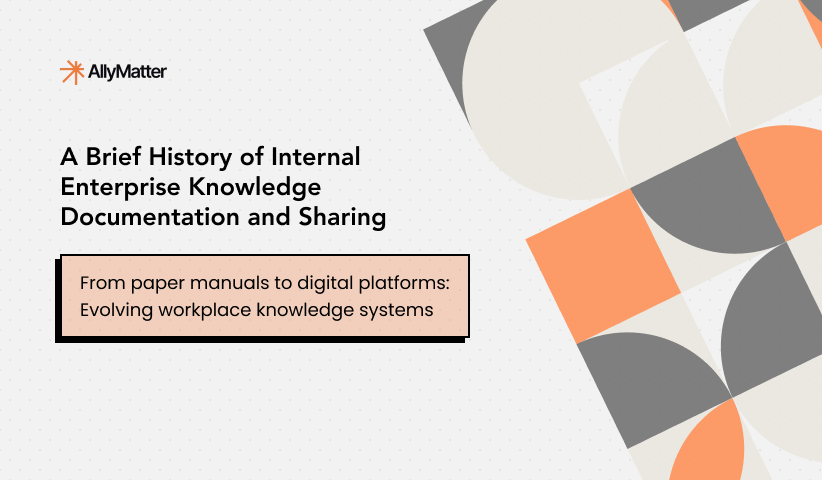Knowledge bases fail more often due to poor implementation than poor tooling. Having worked on knowledge management systems across dozens of growing companies, we’ve observed that success depends on striking the right balance between structure and flexibility during periods of rapid change.
This is particularly critical for organizations experiencing rapid growth, where tribal knowledge leaves as people depart and new processes emerge faster than they can be documented. The challenge isn’t just choosing a tool; it’s building a system that can evolve alongside your company without creating friction. Teams often struggle with systems that start off well but become bottlenecks when they’re too rigid, or devolve into information chaos when they’re too loose.
The key is understanding how various knowledge base architectures manage the natural evolution of a company’s information – from early, informal documentation to mature, structured processes. In this exploration of knowledge base tools, we’ll look at solutions suited for early-stage implementation and for rapid scaling. By comparing how each platform handles documentation, team collaboration, and information organization, we’ll help you choose a system that not only meets your current needs but also adapts to your company’s growth.
Our analysis scope
We cast a wide net when surveying knowledge base solutions, including dedicated documentation platforms and broader tools that offer knowledge base functionality. This article is part 1 of our four-part series analyzing global knowledge bases. Our core filter was straightforward: does the tool allow teams to create, organize, and share internal documentation?
This inclusive approach covered:
- Standalone knowledge base platforms
- Wiki-style tools
- Documentation features embedded in larger workplace solutions
We included specialized documentation tools as well as broader collaboration platforms, tracking everything from simple document repositories to advanced systems with workflow automation and AI capabilities. This broad perspective provides context about where each tool fits in the wider knowledge management landscape.
The resulting analysis covers everything from focused documentation tools like Slab and Outline to more comprehensive platforms like Confluence and ClickUp, which include knowledge base features as part of their broader offerings. Rather than making assumptions about what you need, we lay out what each platform offers so that you can match capabilities to your requirements.
Understanding our analysis
For each platform, we gathered key information across several dimensions to help guide your decisions:
Feature alignment
We assess the feature set of each platform to see how closely it matches core knowledge base needs. Some tools focus primarily on documentation, while others bundle knowledge base capabilities into a broader toolkit. Recognizing this helps you avoid paying for unneeded features or ending up with an overly complex solution.
Content quality support
We evaluate how each platform supports content creation and maintenance, including its editing interface, template systems, and tools for keeping documentation up to date. We also examine how well each platform organizes content, an essential factor when your documentation expands beyond basic needs.
Pricing structure
We look at base costs, per-user fees, and any significant pricing tier jumps. We pay close attention to how pricing scales and whether features like Single Sign-On (SSO) require premium tiers, often a hidden cost in many solutions.
Technical implementation
We review:
- Whether the solution is open source
- Available integrations
- Browser extension availability
- AI capabilities
- Design quality and user interface
- Sharing and collaboration features
We also provide general notes on unique features, limitations, and specific use cases where each tool shines or might fall short. Rather than making direct recommendations, we present this information so you can determine which features align with your needs and growth trajectory.
Knowledge base tools: Global list
Here’s part 1 of the list of tools that can serve as the backbone of a knowledge base in your organization.
Atlassian Confluence
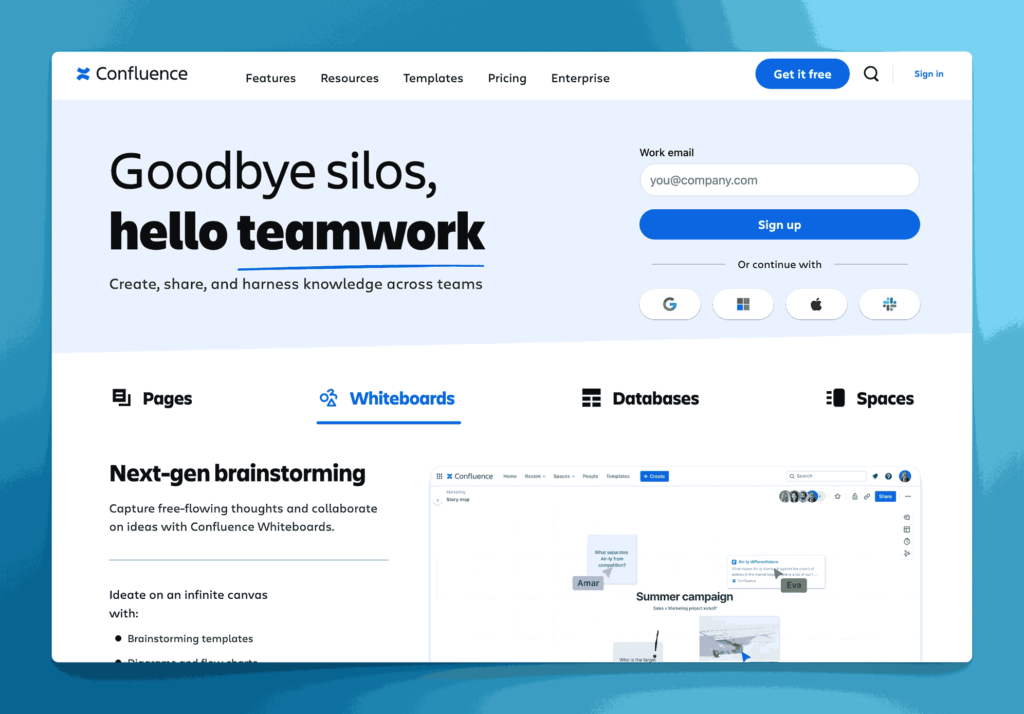
Confluence by Atlassian is a collaborative workspace that can function as a standalone knowledge base, helping teams create, share, and organize knowledge efficiently. It features dynamic pages, whiteboards, databases, and AI tools for automating tasks and summarizing documents. Confluence integrates smoothly with other Atlassian products (like Jira) and many third-party tools, offering a robust library of templates for diverse team needs.
Key information
- Open Source: No, Confluence is not open source.
- Standalone KB Tool: Yes, it can serve as a standalone knowledge base, though it also includes broader project collaboration features.
Why you might like it
- Centralized knowledge repository
- Suitable for multiple teams (marketing, project planning, software development, etc.)
- Robust security with user-level permissions
- Rich integration ecosystem with Atlassian suite and other tools. You will like this if you are already using Atlassian’s other tools like Jira and have large dev and product teams who are already working on Jira.
Potential considerations
- Complexity: Might be overkill for very small teams or simple documentation needs.
- Pricing Tiers: Free tier for up to 10 users, then $5.16, $9.73 per user. Enterprise plan available.
Slab
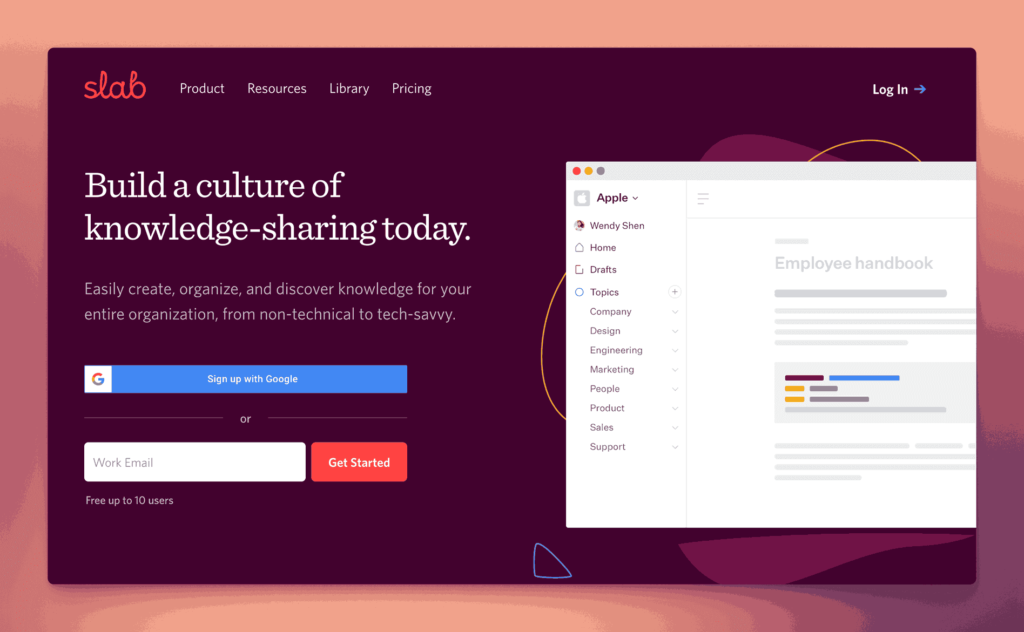
Slab is a dedicated knowledge base platform that emphasizes a clean, intuitive interface for team documentation. It offers powerful editing tools, version history, and an advanced search function, making it easy to create, update, and find information. Slab integrates with popular apps (e.g., Slack, GitHub) to keep your documentation workflow streamlined.
It is built for both technical and non-technical teams and their needs.
Key information
- Open Source? No, Slab is not open source.
- Standalone KB Tool? Yes, Slab can be used entirely as a standalone knowledge base.
Why you might like it
- Minimal, user-friendly interface that lowers adoption barriers
- Powerful search to quickly locate relevant content
- Version history for transparent tracking of content edits
- Integrations with popular tools (e.g., Slack, GitHub), centralizing knowledge.
Potential considerations
- Pricing can scale up depending on team size and feature needs. Free for up to 10 users. $6.67, $12.50 and Enterprise pricing for organizations with more than 10 users.
- Advanced administrative features (such as SSO) may require higher-tier plans
Outline
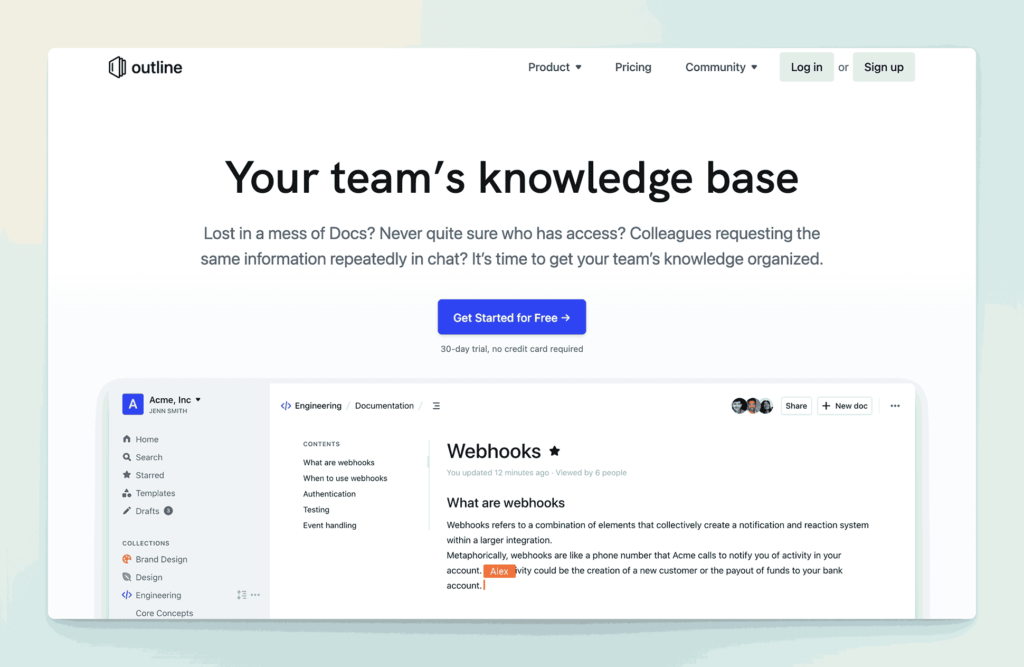
Outline is an open-source knowledge base tool designed for collaborative team documentation. It offers a clean, intuitive interface, hierarchical content organization, and robust search capabilities, making it easy to create, share, and maintain information. With built-in integrations (e.g., Slack, Zapier) and a focus on simplicity, Outline can serve as a seamless hub for storing and accessing your team’s knowledge.
Key information
- Open Source? Yes, Outline is open source. It uses a Business Source License 1.1.
- Standalone KB Tool? Yes, Outline can function as a fully standalone knowledge base.
Why you might like it
- Hierarchical organization for structuring documentation into nested collections
- Powerful search to quickly locate relevant pages
- Clean, user-friendly interface that requires minimal onboarding
- Slack and Zapier integrations for streamlined workflows
Potential considerations
- Self-hosting requires your own server resources and technical setup if you opt for on-premise
- License – $10 per month for up to 10 users, $79 for 11 to 100 users, $249 for 101-200 users on the Cloud. Self-managed instances are free for an unknown number of users, Business and Enterprise editions are $4 and $5 per user per month.
- Limited advanced features compared to more comprehensive project management or collaboration platforms
- Community-driven support model, which may affect response times for troubleshooting.
Notion

Notion is a versatile collaboration platform that combines documents, databases, and wikis in one place. Its flexibility allows teams to build a fully customized knowledge base with pages and subpages, while also supporting task management and other workflow needs. Users can embed various media types, create relational databases, and organize content in a highly visual, drag-and-drop interface.
Requires third-party plugins for approval workflows, compliance and many other essential features which are needed for many organizations.
Key information
- Open Source? No, Notion is not open source.
- Standalone KB Tool? Not purely standalone, it’s a multipurpose platform, but it can effectively serve as a knowledge base.
Why you might like it
- Flexible page structure: Easily create and rearrange pages, subpages, and databases
- Rich content embedding: Insert images, videos, code snippets, and more
- Powerful templates: Pre-built layouts and customizable templates help standardize documentation
- Collaboration features: Real-time editing, comments, and @mentions for quick feedback
Potential considerations
- Broad feature set: Might be more complex than necessary if you only want a simple knowledge base
- Pricing tiers: Free for personal use, $10 and $15 per seat per month for Plus and Business plans. Enterprise plans on request. Advanced permissions and admin controls may require higher-tier plans
- Learning curve: Navigating databases, relations, and templates can be challenging for first-time users
Slite
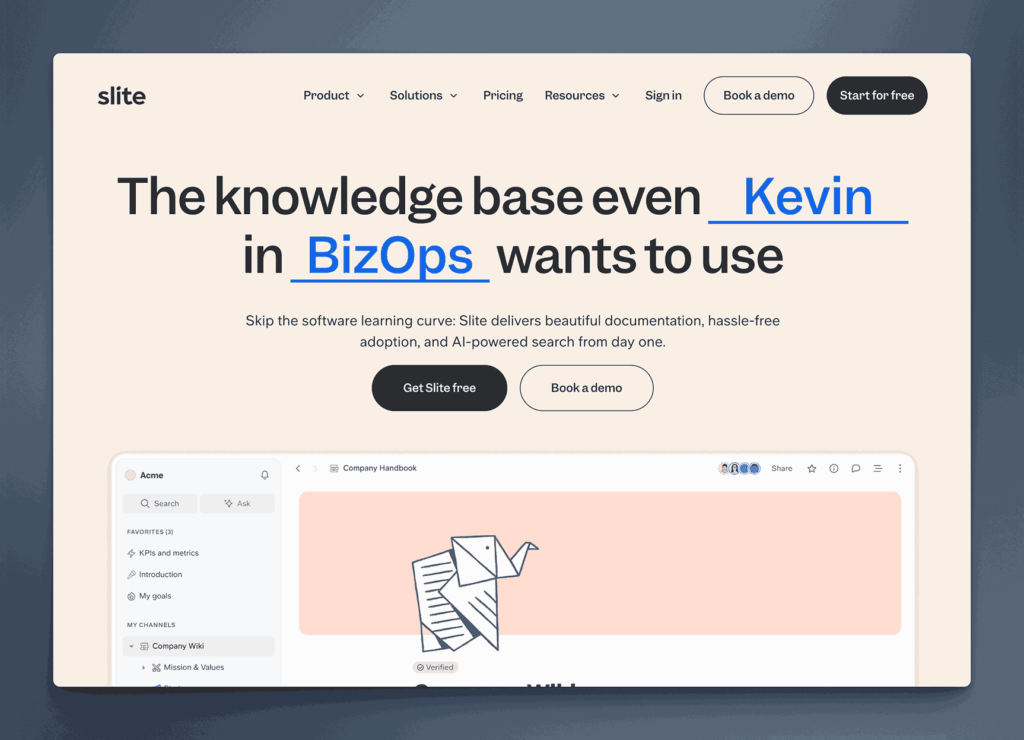
Slite is a collaborative documentation platform with a Slack-inspired interface, making it particularly user-friendly for teams already familiar with chat-based tools. It offers real-time editing, threaded comments, and simple content organization through channels and folders. Slite focuses on ease of use, helping teams rapidly create and share knowledge without steep learning curves.
Key information
- Open Source? No, Slite is not open source.
- Standalone KB Tool? Yes, Slite can function as a standalone knowledge base.
Why you might like it
- Simple organization: Channels, folders, and tags help keep documentation tidy
- Integrations: Connects with tools like Slack and GitHub to streamline workflows
- Desktop App: Use the desktop app for easy access to all documents on your desktop
Potential considerations
- Limited advanced features: May not offer the same feature depth as broader project management suites
- Pricing – $8 and $10 for Standard and Premium plans, Enterprise plans available. Scales based on team size and feature requirements
- Fewer built-in automation capabilities compared to larger, more established platforms
Guru
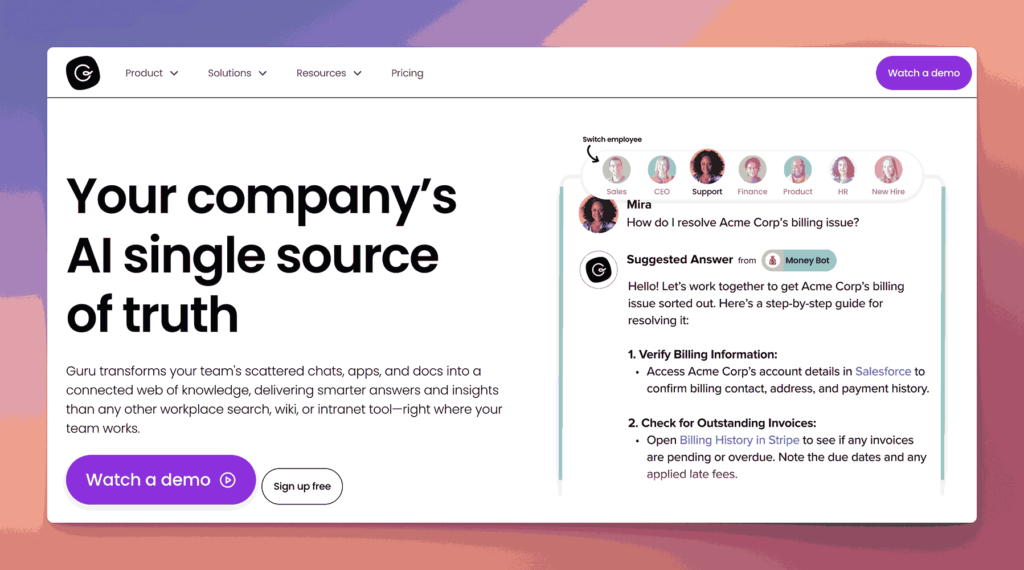
Guru is a knowledge management platform designed to provide real-time information to teams through a browser extension, Slack integration, and other communication tools. It uses “Cards” for quick access to bite-sized knowledge and includes verification workflows to ensure information stays accurate and up to date.
It provides a verifier system which helps users understand the accuracy of information in the knowledge base.
Key information
- Open Source? No, Guru is not open source.
- Standalone KB Tool? Yes, Guru can be used solely as a knowledge base solution.
Why you might like it
- Real-time accessibility: Browser extension and Slack integration allow quick retrieval of information
- Verification workflow: Ensures content remains accurate through regular checks and approvals
- Card-based format: Breaks down information into smaller, easily digestible pieces
- Contextual insights: Automatically surfaces relevant knowledge within your workflow
Potential considerations
- Pricing may increase based on team size or advanced feature needs. Starts at $18 per user per month. Enterprise plans available.
- Limited long-form documentation features compared to more document-centric platforms
- Learning curve for teams unfamiliar with card-based content organization
Nuclino
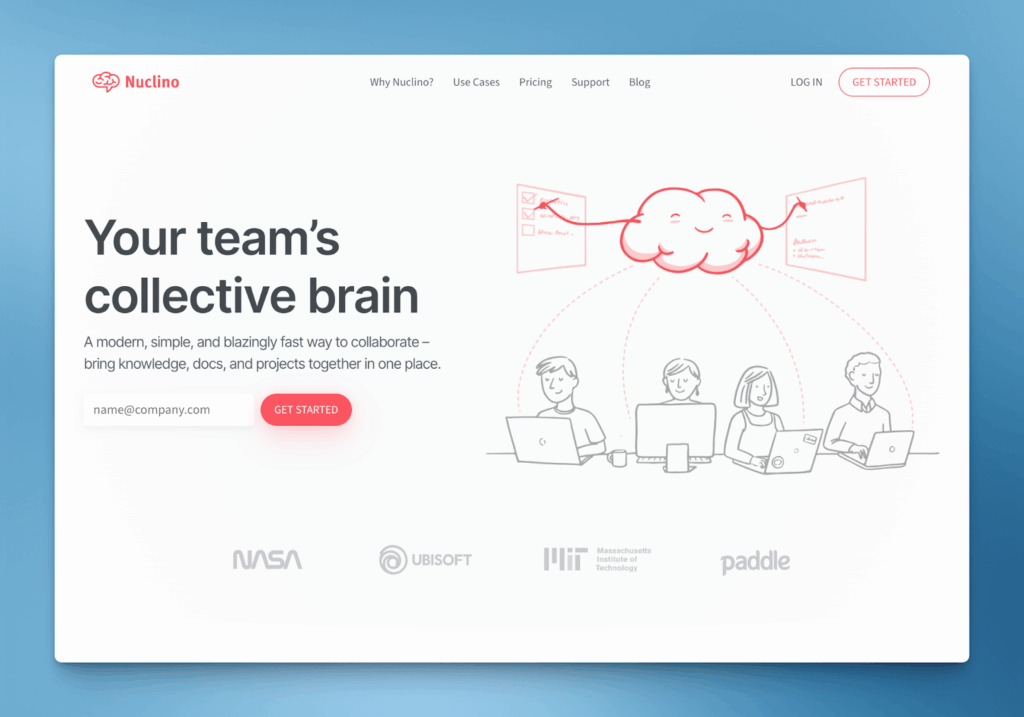
Nuclino is a lightweight, real-time collaboration tool designed to help teams build and maintain knowledge bases and wikis. Its intuitive interface uses a card-based, visual workspace where you can create and link pages (or “items”) to organize information. Nuclino also supports real-time editing and commenting, making it easy for teams to collaboratively update and refine documentation.
Key information
- Open Source? No, Nuclino is not open source.
- Standalone KB Tool? Yes, Nuclino can serve as a standalone knowledge base.
Why you might like it
- Simple, visual organization: Create interlinked pages and visually map out relationships
- Real-time collaboration: Edit simultaneously and leave in-line comments for quick feedback
- Minimalistic interface: Easy for new users to adopt without a steep learning curve
- Search and linking: Quickly locate content and cross-reference related pages
Potential considerations
- Limited advanced features: May not offer the depth of larger, more comprehensive platforms
- Pricing tiers: Basic version is free, $6 and $10 for Starter and Business plans
- Lacks extensive integrations compared to some other knowledge management tools
Tettra
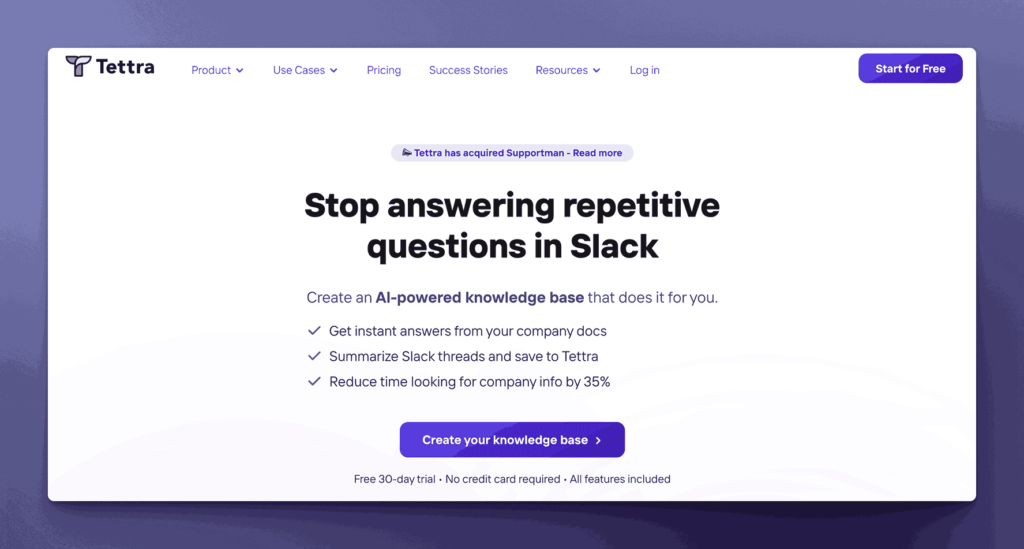
Tettra is a knowledge management platform that integrates tightly with Slack and Microsoft Teams, focusing on a Q&A-driven approach to sharing and organizing information. It allows teams to create and maintain internal documentation in a user-friendly environment, with a strong emphasis on capturing and surfacing knowledge in real time.
Key information
- Open Source? No, Tettra is not open source.
- Standalone KB Tool? Yes, Tettra can be used as a standalone knowledge base.
Why you might like it
- Q&A-driven workflow: Encourages users to ask questions and get quick, documented responses
- Slack/MS Teams integration: Allows easy knowledge sharing within familiar communication tools
- Simple content structure: Provides straightforward templates and categories for organizing documentation
- Verification reminders: Helps keep documentation accurate and up to date
Potential considerations
- Limited advanced features: Focuses on Q&A and basic documentation, which may not meet complex needs
- Pricing: $5 per user per month for Basic with a minimum of 10 users, $10 per user per month for Scaling with a minimum of 10 users, $7200 per year for Professional with 50 users included.
- Narrower integration ecosystem: Strong focus on Slack and Teams, but fewer other native integrations
Zendesk Guide

Zendesk Guide is the knowledge base component of the larger Zendesk Suite, designed to help businesses create, organize, and deliver customer-facing or internal documentation. It offers customizable themes, AI-powered answer suggestions, and a self-service portal to quickly surface relevant content. Although it’s best known for customer support, it can also function as an internal knowledge repository.
Not really designed or built for internal teams’ usage. It is built to let internal teams serve external customers. Help desk features dominate the knowledge base platform.
Key information
- Open Source? No, Zendesk Guide is not open source.
- Standalone KB Tool? Not purely standalone; it’s part of Zendesk, but can be used primarily as a knowledge base solution within the suite.
Why you might like it
- Easy self-service: Enables customers or team members to quickly find answers on their own
- AI-powered suggestions: Suggests relevant articles based on inquiries or ticket context
- Customizable design: Offers theming options to match branding or internal style preferences
- Robust analytics: Tracks search queries, article views, and engagement for continuous improvement
Potential considerations
- Focus on customer support: May have more features than needed if you only want internal documentation
- Pricing: Part of the broader Zendesk ecosystem, which might be costlier for smaller teams. Starts at $25 per agent per month, and goes up to $149 per agent per month. Enterprise plans available.
- Integration limits: Works best alongside Zendesk products; third-party integrations may be more limited
Document360

Document360 is a dedicated knowledge base software that allows you to create, manage, and publish documentation for both internal teams and external customers. It features a markdown-based editor, category-based organization, and robust versioning capabilities. It also offers advanced analytics and customizable branding options, making it suitable for businesses looking for a professional, standalone KB solution.
Key information
- Open Source? No, Document360 is not open source.
- Standalone KB Tool? Yes, Document360 is specifically designed as a standalone knowledge base.
Why you might like it
- Markdown-based editor for quick and easy content creation
- Category and subcategory structure for organized documentation
- Versioning and rollback to track and revert to previous document states
- Custom branding and domain support to keep your KB on-brand and professional-looking
- Analytics and reporting to monitor article performance and user engagement
Potential considerations
- Pricing is not public but may be higher than generic documentation tools, especially for larger teams
- Limited broader collaboration features, as it focuses on KB functionality rather than project management
- Learning curve for those unfamiliar with markdown-based editing
Helpjuice
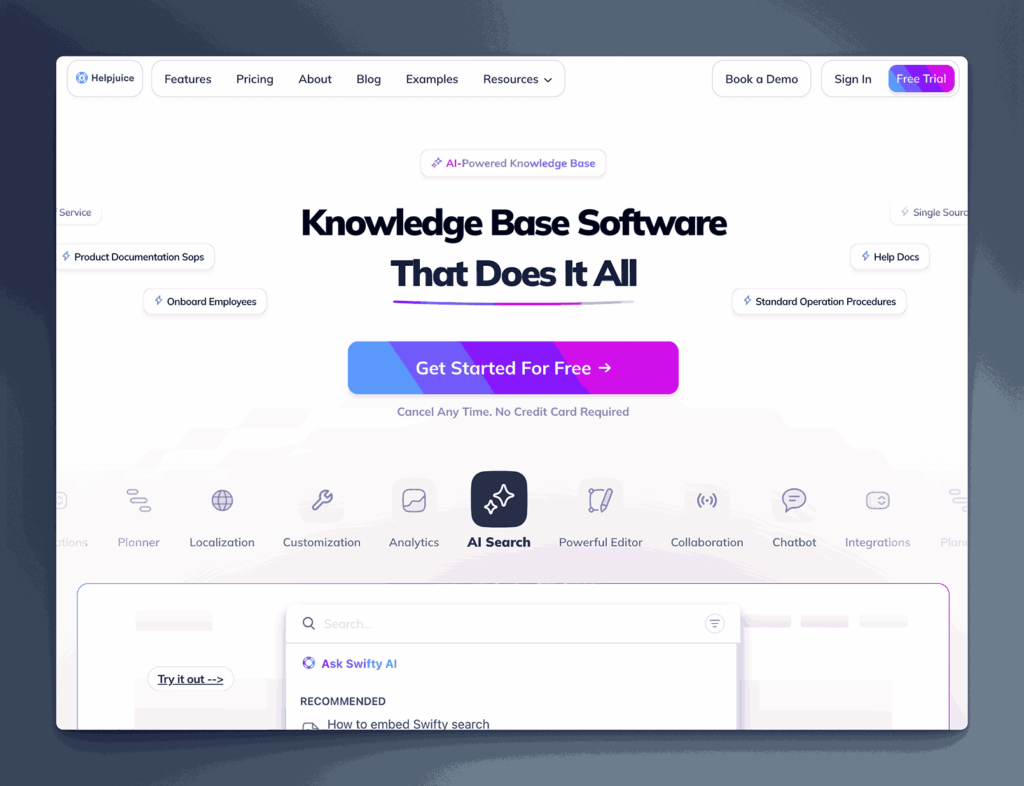
Helpjuice is a standalone knowledge base platform aimed at helping businesses create and organize their documentation for both internal teams and external customers. It offers customizable templates, a powerful search function, and detailed analytics to help understand how users engage with content. With a focus on ease of setup and usability, Helpjuice can be quickly deployed to support self-service support and internal knowledge sharing.
Key information
- Open Source? No, Helpjuice is not open source.
- Standalone KB Tool? Yes, Helpjuice operates primarily as a standalone knowledge base solution.
Why you might like it
- Customizable templates to match branding and design preferences
- Powerful search functionality to help users quickly find the right content
- Analytics and reporting that reveal gaps in documentation and measure performance
- Easy setup allows teams to get started without lengthy onboarding
Potential considerations
- Pricing starts at $120 per month for 4 users, $200 for 16 users, $289 for 60 users and $659 for unlimited users.
- Feature depth is focused on KB functionality, so broader collaboration or project management features are limited
- Integration options may not be as extensive as some larger, multi-tool platforms
Freshdesk Knowledge Base
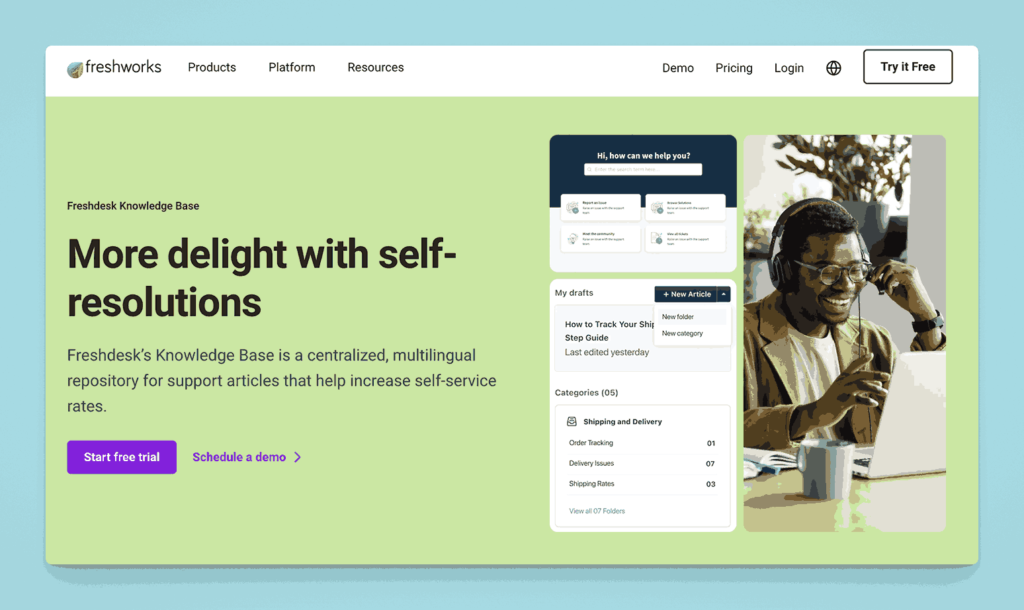
Freshdesk Knowledge Base is part of Freshdesk’s customer support suite, enabling teams to create and manage public or private documentation. It offers a simple editor, SEO settings for public content, and a portal for end users to search articles.
Built for serving external users first. Might not be a good fit for internal documentation needs, especially for HR, Operations and Finance teams, or for writing internal SOPs.
Key information
- Open Source? No, it is not open source.
- Standalone KB Tool? Not purely standalone; part of the Freshdesk suite, though it can function independently as a knowledge base module.
Why you might like it
- Integrated with Freshdesk Support for ticket deflection and unified customer support
- SEO-friendly features for public knowledge bases
- Analytics to monitor popular articles and identify content gaps
- Multiple language support for global audiences
Potential considerations
- Costs – Free for up to 2 agents, $15 and $49 per agent per month for Growth and Pro plans. Enterprise plans available. Will increase if you need to add additional FreshWorks tools.
- Focus on customer-facing documentation rather than purely internal KB needs
- Limited advanced collaboration features compared to all-in-one documentation tools
Crisp Helpdesk Knowledge Base

Crisp is a customer messaging platform that also includes a Helpdesk Knowledge Base feature. It lets you publish help articles for customers, embed media, and customize the look and feel of your help center. Articles can be linked to Crisp’s live chat for context-based support.
Key information
- Open Source? No, Crisp is not open source.
- Standalone KB Tool? Not purely standalone; it’s part of Crisp’s broader customer communication suite, though you can use only the Knowledge Base function if desired.
Why you might like it
- Live chat integration for context-driven article suggestions
- Simple article editor for quick content creation
- Customizable design to match your brand
- Multilingual support for customer-facing content
Potential considerations
- Feature set is primarily oriented toward external (customer) help centers
- Pricing can escalate when combining multiple Crisp features (chat, campaigns, knowledge base)
- Less suitable for purely internal documentation if you need deeper collaboration or versioning
BookStack
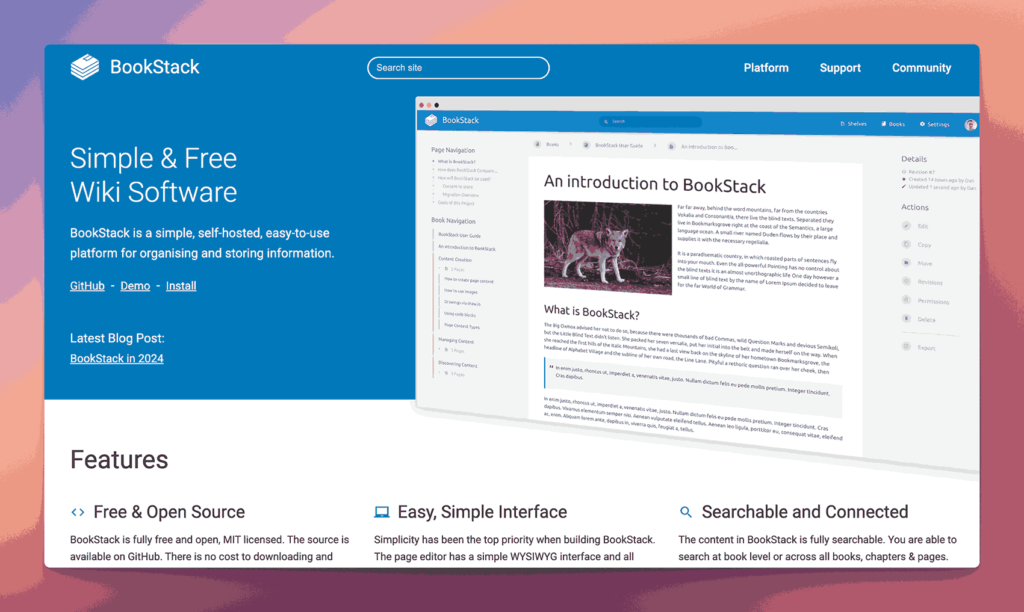
BookStack is an open-source platform designed specifically for creating and organizing documentation in a book-like structure. It uses a hierarchical system of “Books,” “Chapters,” and “Pages,” making it easy to navigate and maintain.
Key information
- Open Source? Yes, BookStack is open source.
- Standalone KB Tool? Yes, it’s designed as a standalone knowledge base/documentation tool.
Why you might like it
- Simple, intuitive hierarchy (Books → Chapters → Pages) for clarity
- Self-hosting gives you full control and data ownership
- WYSIWYG editor or Markdown support for flexible content creation
- Active community providing updates and support
Potential considerations
- Requires hosting and maintenance for self-hosted setup. No cloud options available.
- Limited built-in integrations compared to commercial, cloud-based options
- Fewer advanced features (e.g., AI or advanced analytics) out of the box
- License – Available with an MIT License
DokuWiki
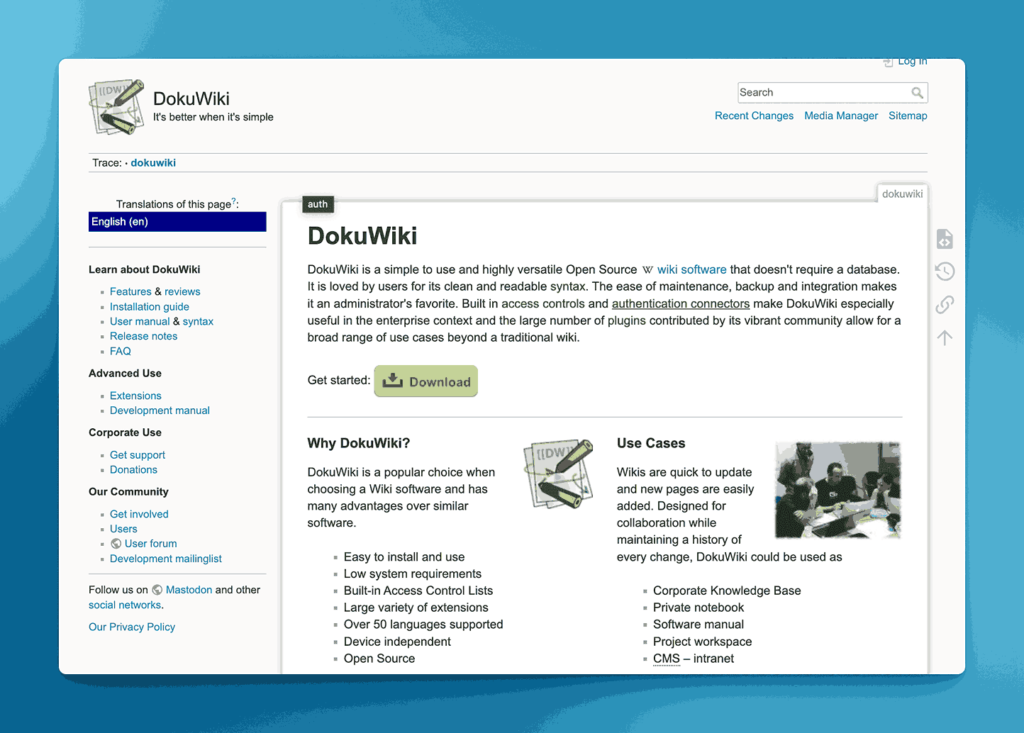
DokuWiki is a lightweight, open-source wiki platform that stores data in plain text. It’s popular for its simplicity, ease of maintenance, and ability to run on basic hosting packages. DokuWiki supports version control on pages without the need for databases.
There are hosting providers who provide you the ability to host it on the cloud. Requires handholding though.
Key information
- Open Source? Yes, DokuWiki is open source.
- Standalone KB Tool? Yes, it functions independently as a knowledge base/wiki tool.
Why you might like it
- No database required, runs on plain text files
- Easy to install and maintain with minimal technical overhead
- Strong plugin ecosystem to extend functionality
- ACL (Access Control Lists) for granular user permissions
Potential considerations
- UI design can be more basic and less modern than commercial solutions
- Setup might require technical know-how for customization or plugin management
- Limited built-in collaboration features (e.g., real-time editing) without extensions
- License – Available under the GNU General Public License
MediaWiki
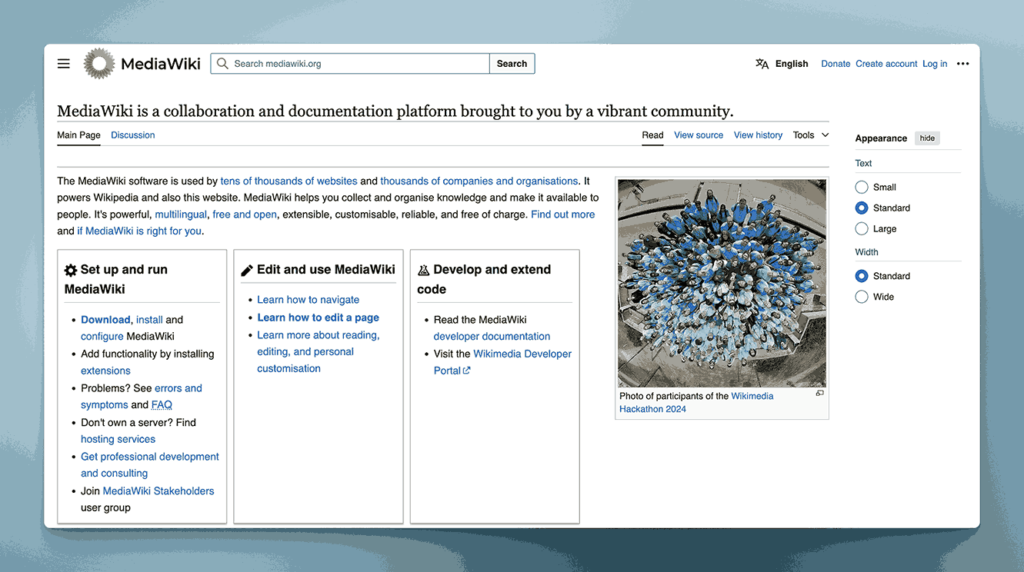
MediaWiki is the open-source software powering Wikipedia, known for handling large-scale, collaborative documentation. It’s highly configurable but can require significant setup for features like themes, advanced permissions, and extensions.
Key information
- Open Source? Yes, MediaWiki is open source.
- Standalone KB Tool? Yes, it’s a robust, standalone wiki solution.
Why you might like it
- Extremely scalable, proven to handle massive amounts of content
- Active community and plugin ecosystem for customizing functionality
- Version history and robust revision control built-in
- Ideal for large, collaborative projects needing wiki-style editing
Potential considerations
- Complex setup: Configuration can be time-consuming, especially for non-technical users
- UI is wiki-focused and might feel outdated or less intuitive for some teams
- Requires plugins for features like WYSIWYG editing, advanced permissions, or SSO
- License – Available under the GNU General Public License
GitBook
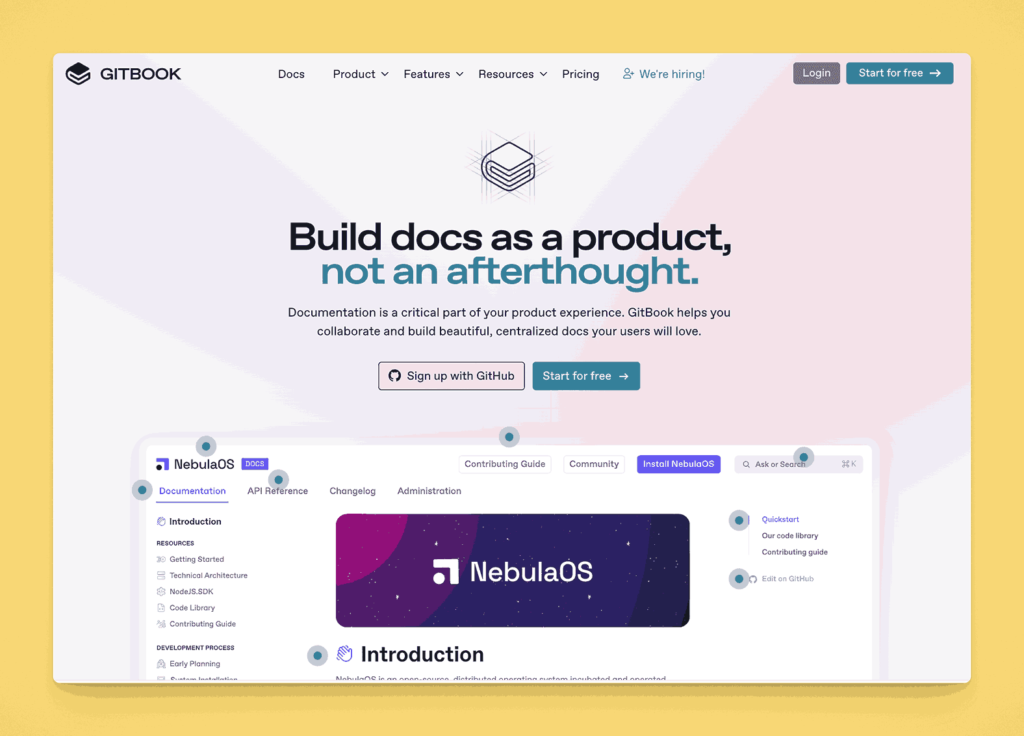
GitBook started as a tool for publishing Git-based documentation but has evolved into a polished platform for writing and hosting content. It provides a clean, modern interface for docs, supports live previews, and can integrate with GitHub for version control.
Key information
- Open Source? The original GitBook CLI was open source, but the hosted GitBook service is not fully open source.
- Standalone KB Tool? Yes, it can serve as a standalone documentation/knowledge base solution.
Why you might like it
- GitHub integration for version control and collaborative writing
- Modern design with a clean, minimal interface
- Live previews and Markdown-based editing
- Custom domains and branding for professional presentation
Potential considerations
- Free vs. paid: Offers a free plan. Paid plans start at $65 and $249 per site per month. Adding additional collaborators starts at $12 per collaborator per month.
- Less “wiki-like” collaboration model, more aligned with docs or developer-oriented content
- Advanced features (e.g., SSO, advanced roles) may be locked behind premium tiers
Docsify
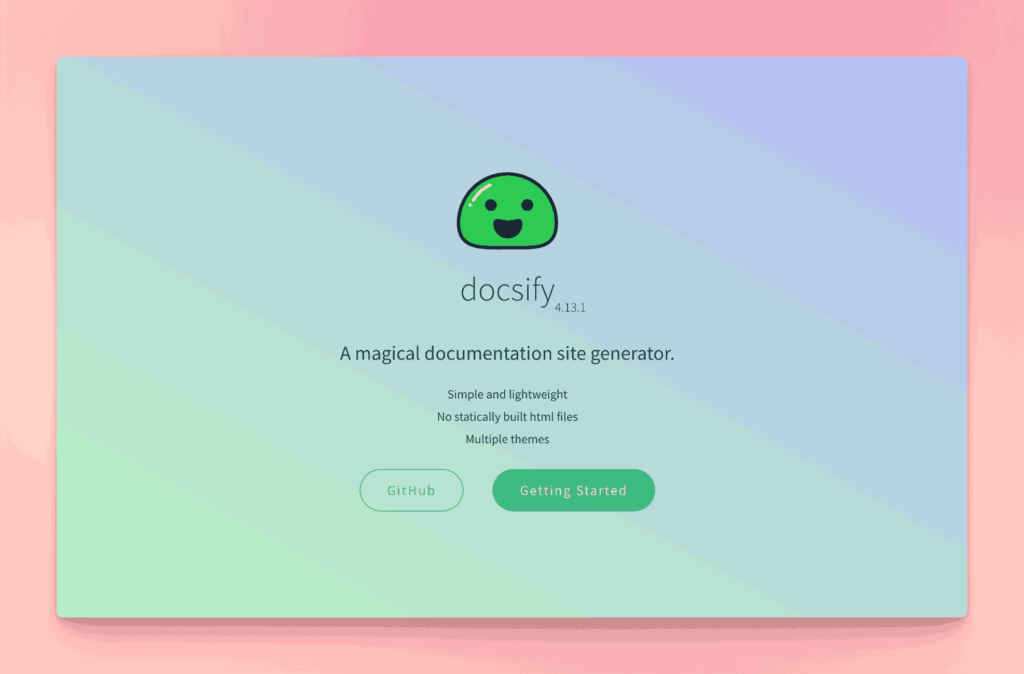
Docsify is an open-source solution for quickly generating single-page documentation sites from Markdown files. Geared primarily toward developers, it runs client-side, making it easy to host on services like GitHub Pages.
Key information
- Open Source? Yes, Docsify is open source.
- Standalone KB Tool? Yes, it can function as a lightweight knowledge base solution if you prefer Markdown and static hosting.
Why you might like it
- No build process required; content is rendered on the fly from Markdown
- Extremely lightweight and easy to host anywhere
- Plugin ecosystem for expanding functionality (search, sidebar, etc.)
- Ideal for developer-focused documentation or quick static sites
Potential considerations
- Limited feature set compared to full-fledged KB platforms (no built-in user management, analytics, etc.)
- Manual configuration can be required for theming, navigation, or advanced features
- Not suited for non-technical users who want a turnkey solution
- Available under a MIT License
AllyMatter: The right knowledge base platform
The platforms covered in this analysis each serve different organizational needs and technical requirements. While some excel in specific areas – Confluence for technical teams, Slab for simplicity, or BookStack for open-source flexibility – AllyMatter bridges the gap between ease of use and enterprise functionality.
AllyMatter eliminates the common trade-offs between powerful features and user adoption. Our platform provides the collaborative simplicity of tools like Notion with the governance controls of enterprise solutions like Confluence, ensuring your team can start immediately while building toward sophisticated knowledge management as you grow.
Interested to know more? Click here to read part 2 of this series.
Frequently asked questions about knowledge base platforms
How do I choose between Confluence and simpler alternatives like Slab?
Confluence works best for teams already using Atlassian tools or needing complex project integration. Slab excels for straightforward documentation with minimal setup. Consider Confluence if you have technical teams managing complex workflows, or Slab if you prioritize ease of adoption and clean interfaces.
Are open-source knowledge bases like BookStack worth the technical overhead?
BookStack and MediaWiki offer cost savings and complete control but require ongoing technical maintenance. They work well for tech-savvy teams or organizations with dedicated IT support. Choose commercial solutions if you lack technical resources or need immediate implementation.
What’s the difference between knowledge bases and document management systems?
Knowledge bases focus on searchable, interconnected information sharing, while document management systems emphasize file storage and version control. Platforms like Notion blur these lines, offering both approaches. Choose based on whether you prioritize collaborative knowledge sharing or structured document workflows.
Should I start with a free platform and upgrade later?
Free tiers from Notion, Outline, or Slab work well for small teams testing knowledge base concepts. However, migrating content and retraining users costs time and effort. If you’re committed to knowledge management, investing in a scalable solution from the start often proves more efficient.
How do I know if my team needs a specialized knowledge base or if general tools suffice?
If your team already collaborates effectively in Google Drive or SharePoint, you might not need a dedicated platform immediately. However, as content volume grows beyond 100 documents or when you need structured permissions and search, specialized knowledge bases become essential for maintaining organization and accessibility.


